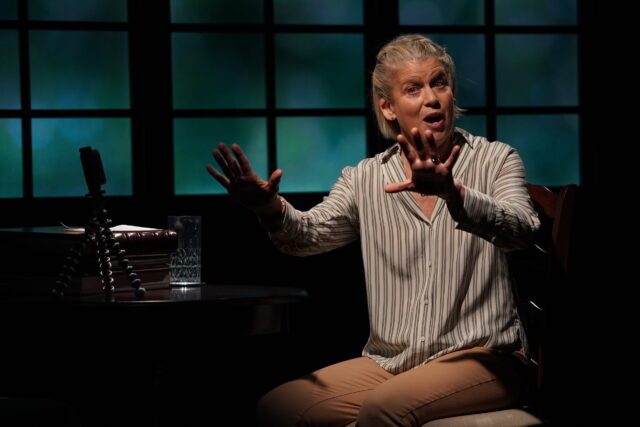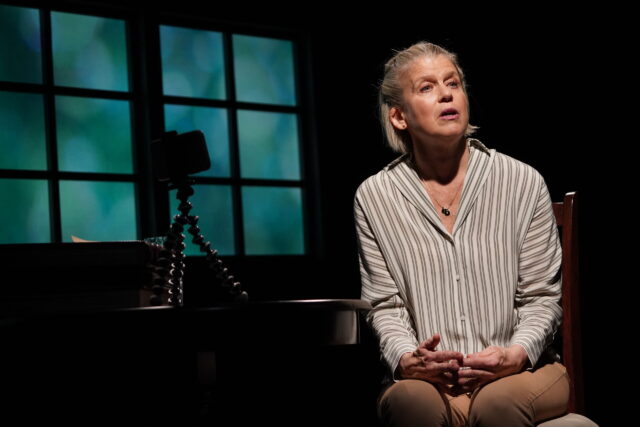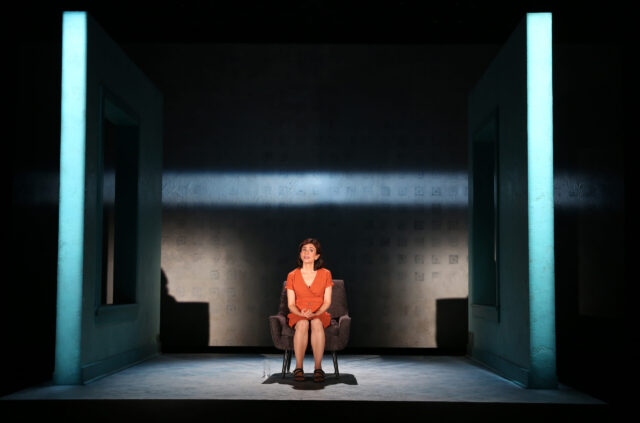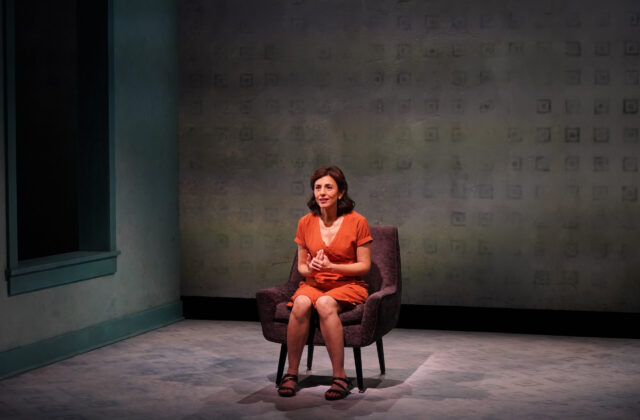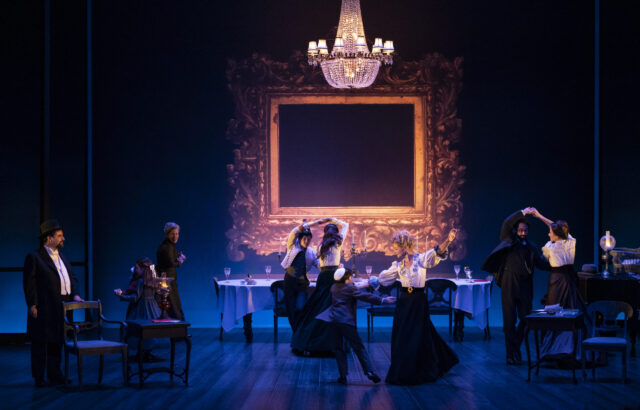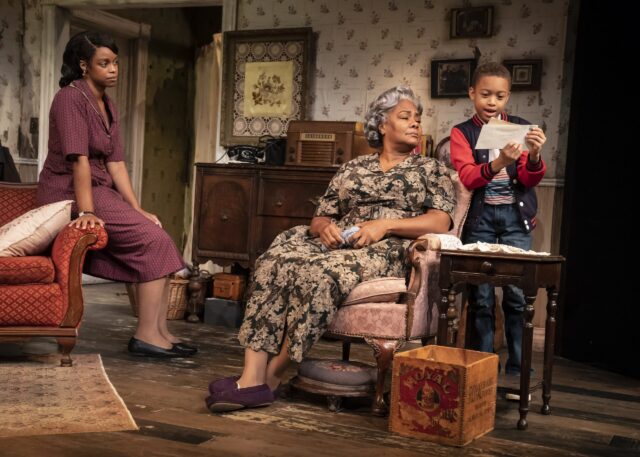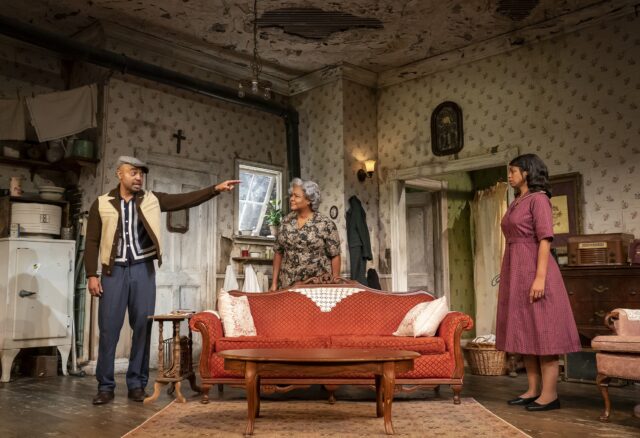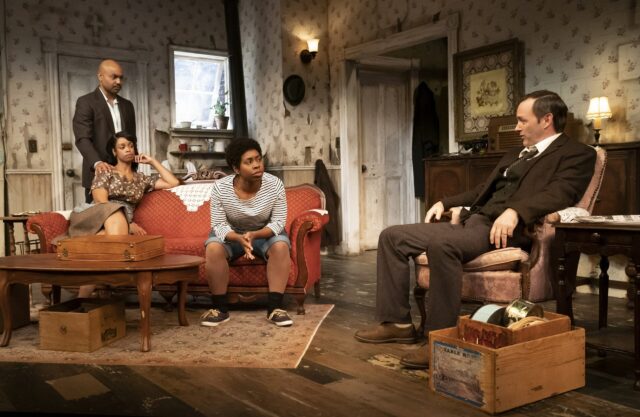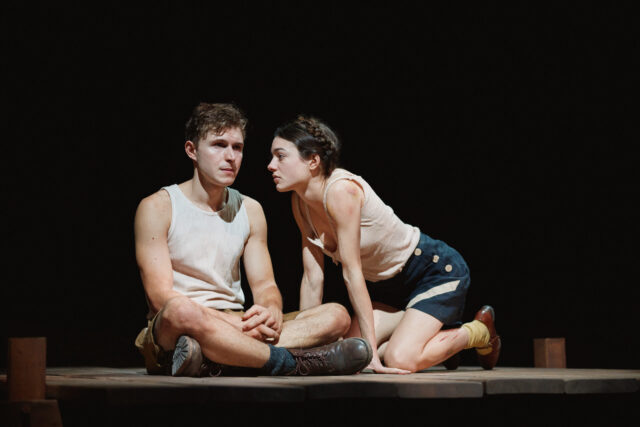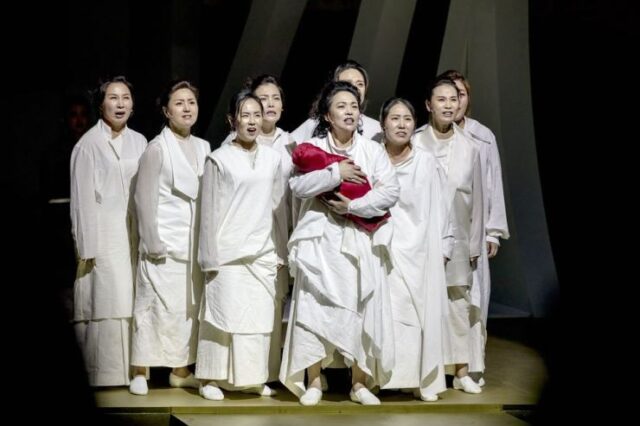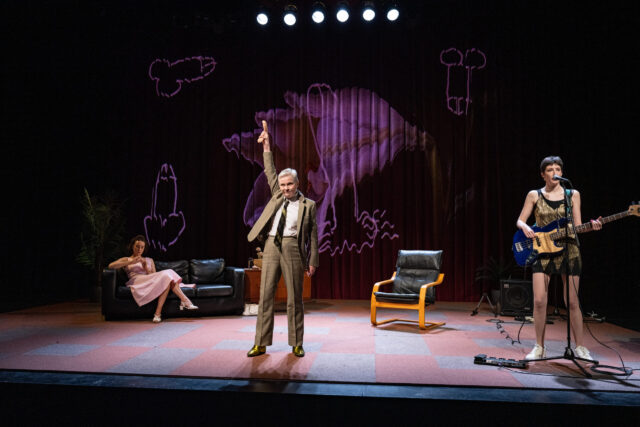
Gina Moxley makes a phallic point in The Patient Gloria (photo by Teddy Wolff)
THE PATIENT GLORIA
St. Ann’s Warehouse
45 Water St.
Through December 4, $49-$59
718-254-8779
stannswarehouse.org
www.panpantheatre.com
I never want to end up on Gina Moxley’s shitlist.
In 1964, a thirty-one-year-old chain-smoking divorced mother of a young girl sat down with three distinguished psychotherapists to discuss various aspects of her personal life. The sessions were filmed; the woman, Gloria Szymanski, was told that the recordings were to be used for educational purposes — astonishly, they ended up being shown in theaters. Three Approaches to Psychotherapy, which became more familiarly known as The Gloria Films, documented Gloria speaking with Dr. Carl Rogers, whose specialty was client-centered therapy; Dr. Frederick Perls, founder of Gestalt therapy; and Dr. Albert Ellis, whose discipline was rational-emotive therapy.
Dublin-based actor and playwright Moxley shares Gloria’s story in The Patient Gloria, a stirring seventy-five-minute work making its US premiere at St. Ann’s Warehouse. Focusing on the misogyny inherent in the field of psychology and society at large, it may have taken place more than half a century ago, but the attitudes remain all too contemporary.
As the audience enters the theater, Moxley is sitting at a small table at the front of the stage to the right. Behind her, Gloria (Liv O’Donoghue), in a pouffy hairdo and an elegant white dress that shows off her long legs, tries to relax on a couch. She might look like the wife straight out of an early 1960s sitcom, except she is about to talk about sexual desire in a way that Donna Reed (The Donna Reed Show) and June Cleaver (Leave It to Beaver) never dreamed of.
As the play begins, Moxley, in tight-fitting men’s pants, a white button-down shirt, and awesome gold shoes (the costumes are by Sarah Bacon), asks the audience if they can hear her. She then gets up and says, “Can you see me? That any better? Can you see me now? You can? Wow. Yes. Miraculous. You should not be able to see me at all. Seriously, I’ve been fading for years and am technically invisible by now.” She reveals the item that she was sewing to be a fabric phallus, which she gleefully swings around. “I’m about to play three men — yeah, because I want to — so I felt I needed to get a true feeling for the apparent sense of authority and entitlement that comes with this lump of meat, of manhood,” she says, offering an alternate interpretation of Sigmund Freud’s theory of penis envy. “Since I’ve always been good with my hands I thought I’d make myself a nice, muscular dick to help me get into character.” The male member is a humorous motif that continues throughout the play.
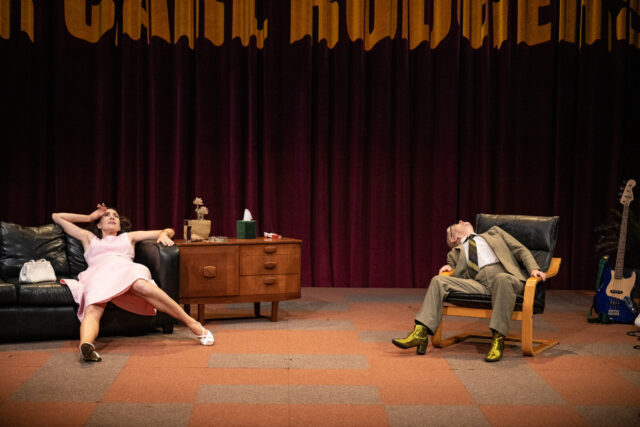
Gloria (Liv O’Donoghue) and one of her psychotherapists (Gina Moxley) are exasperated in US premiere at St. Ann’s (photo by Teddy Wolff)
Moxley proceeds to portray each of the three doctors, with slight adjustments to her costume, accent, and demeanor, as Gloria explains that her major concern is how to tell her nine-year-old daughter, Pammy, that since the divorce she has been having sex with men other than Pammy’s father. She tells Dr. Rogers, “The other day she asked, ‘Mommy, did you ever go to bed with anyone besides Daddy?’ And I lied to her. I looked straight into her eyes and lied, ‘No, honey.’ I mean, what was I meant to say? ‘Sure, honey, everyone does.’ Oh shit. It keeps coming into my mind. I feel so guilty having lied to her. I never lie, I hate liars. I want — I can’t help wanting . . . I remember when I was a little girl and found out my parents made love, oh, it was dirty, terrible. I was particularly disgusted by my mom.”
The idea of a woman, no less a mother, admitting to having and enjoying sex for pleasure has always been frowned upon by much of America, yesterday and today, and the psychotherapists aren’t hesitant to demean Gloria by displaying their own sexual desires for her, thinking with their dicks. Just as Moxley announced at the beginning that she assumed she couldn’t be heard or seen, Gloria is not truly being listened to by the doctors.
To assert themselves and celebrate their quest for individuality and freedom, Gloria and Moxley occasionally break out into joyous dancing (O’Donoghue is also the choreographer), sometimes joined by experimental Irish bassist Jane Deasy, who participates in several dialogues. Feeling like a devil, Gloria says, “I want to get rid of my guilt. But I don’t want to put it on Pammy. Guilt kills.” “Guilt kills,” Moxley agrees. “Guilt kills. Ain’t that the truth,” Deasy adds. A few minutes earlier, Deasy had come to the front of the stage, stood at a microphone, and performed a version of the all-female rock band L7’s “Shitlist,” declaring, “For all the ones / Who bum me out / Shitlist / For all the ones / Who fill my head with doubt / Shitlist / For all the squares who get me pissed / Shitlist / You’ve made my shitlist.”
Presented by Beckett experts Pan Pan (Cascando, Embers), The Patient Gloria is directed by John McIlduff (The Scorched Earth Trilogy, Fatal System Error) with a mix of chaos, absurdity, and exhilaration. Andrew Clancy’s open set counters the claustrophobic design of The Gloria Films, where the subject was mostly seen in the shadow of the supposedly brilliant, much more powerful men. Adam Welsh’s sound and Sinéad Wallace’s lighting maintain the overarching welcoming atmosphere, which often has more of a feel of a party than conversations with a shrink. Projections of photos from the original sessions, words, drawings of phalluses, and other imagery appear on the folded red curtain in the back, not always clear, contributing to the at-times disorienting atmosphere.
O’Donoghue (Good Sex, Lippy) portrays Gloria with a subtle fierceness; the character might be nervous and off balance speaking with the psychotherapists, but she also is not ashamed of the choices she has made. Moxley (Danti-Dan, Endgame), here a dynamic sprite who, dressed as a man, resembles a cross between Mike Pence, Jeff Sessions, and Lindsey Graham, is bursting with an infectious, confident energy that fills St. Ann’s. And the tall, thin Deasy adds just the right flourishes, including a rousing finale. Together they don’t just take the power back but revel in it. It’s the kind of play that needs to be performed for the US Congress and at psychiatric conferences around the world.
The real Gloria Szymanski got married and divorced again before dying from leukemia in 1979 at the age of forty-six. In 2008, her daughter, Pamela J. Burry, wrote the book Living with ‘The Gloria Films,’ sharing the effects Three Approaches to Psychotherapy had on her and her mother, who essentially starred in one of the first reality shows. Nearly sixty years after the events of The Patient Gloria, the rights of women to control their bodies are under siege, an undercurrent of the play, which, in its extremely entertaining way, demands that things must change, yet again, as more people make Moxley’s shitlist.

